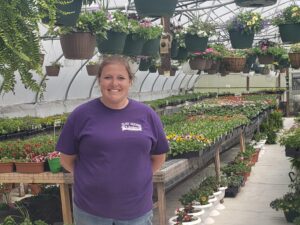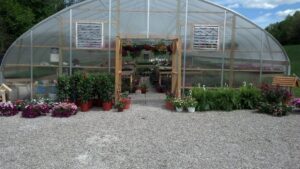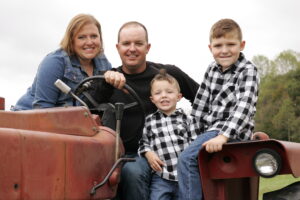
Ashley DeBord took her hobby and love of plants and turned it into a greenhouse operation. Photo courtesy of the DeBord family.
By Dana Rogge, USDA
Ashley DeBord is the owner and operator of Glory Gardens and Greenhouse LLC in Eubank, Kentucky. Managing her business during the pandemic led to adjustments in how she operates and created a bevy of new customers.
From a Hobby to a Business
Ashley has a passion for horticulture. As a college graduation gift, she received a 10-foot by 12-foot hobby greenhouse from her parents. That hobby turned into a full-fledged business in 2012 when the lifelong vegetable and plant grower decided to scale up production.
Before she and her husband Stephen had their two sons, Logan and Ellis, Ashley had 8 acres of vegetables.
With help from Farm Service Agency’s farm loan programs, Ashley purchased equipment to put in her vegetable crops.
Her focus is less on growing produce now that a larger greenhouse has been built for flowers, vegetable plants, herbs and hanging baskets.
A Season Like No Other
The spring of 2020 would be like no other, one where Ashley, and her customers, had to learn to adapt to new ways of doing business.
“As with every year, we prepared for our greenhouse to be buzzing with customers, but what we hadn’t prepared for was COVID-19,” she said. “It took some time and creativity to find a way to get our product to our customers but also to be diligent in keeping our family as well as our customers healthy and safe.”

Glory Gardens and Greenhouse produce a variety of plants, including flowers, vegetable plants, herbs and hanging baskets. Photo courtesy of the DeBord family.
To make this happen, Ashley would only allow one family in the greenhouse at a time to promote social distancing. Customers were asked to remain in their vehicle until the greenhouse was clear.
“This step is necessary because the greenhouse is so crowded with plants this time of the year, and it is difficult to move around while giving others 6 foot of space,” she said. “We felt it would be easier for people to shop if they were not concerned with keeping their distance.”
Additionally, she moved her check-out station outdoors and provided hand washing stations.
A New Crop of Customers
The circumstances surrounding 2020 also brought in a surge of new customers to Glory Gardens and Greenhouse. In a normal year, Ashley would see 15 to 20 customers a day, whereas this year, she would see up to 85 customers a day.
“For the first time, I saw my generation, those in their 20s and 30s, coming to the greenhouse,” she said. “We had lots and lots of first-timers.”
She spent a lot of time working with these new gardeners, answering their questions and getting them set up to succeed.
“I loved seeing them and seeing their children in there, asking lots of questions,” Ashley said. “I spent as much time as possible trying to teach that generation because to me that’s very important. I was very tickled to see younger folks come into the greenhouse and even come look at my garden to see what I do. They were really interested.”
It’s this growing interest in gardening that inspired Ashley to expand her operation. She and Stephen are in the process of adding another greenhouse, as well as a garden center where they will sell garden vegetable seed and gardening tools and accessories.

Ashley and her husband Stephen, along with sons Lucas and Ellis, raise cattle, soybeans, silage and hay in addition to their greenhouse operation. Photo courtesy of DeBord family.
Caring for the Land
In addition to their greenhouse operation, Ashley and Stephen raise 50 commercial cows along with soybeans, silage and hay.
To protect their natural resources, they participate in FSA’s Conservation Reserve Program-Grasslands, which protects grassland, including rangeland and pastureland, while maintaining the areas as grazing lands.
“We found some good benefits with that,” she said. “It keeps us accountable on what our plans are and how we take care of the land.”
Ashley has also served on her FSA county committee, which helps deliver FSA farm programs at the local level.
“I really enjoyed that because it really enlightened me a lot on what programs were out there and how to tell people about those programs.”
More Information
USDA offers a variety of risk management, disaster assistance, loan and conservation programs to help agricultural producers in the United States weather ups and downs in the market and recover from natural disasters as well as invest in improvements to their operations. Learn about additional programs.
For more information about USDA programs and services, contact your local USDA service center.





